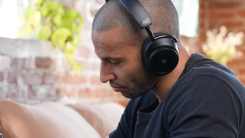Articles by Jose Enrico
-

Xiaomi 18 Leak Teases 5x Periscope Camera, Snapdragon 8 Elite, and Ultra-Durable Design
The Xiaomi 18 is rumored to feature a 5x periscope telephoto lens, Snapdragon 8 Elite chipset, wireless charging, and high dust and water resistance.
-

Apple Secures Crucial Legal Win in France as App Tracking Transparency Survives Court Challenge
A French court lets Apple keep App Tracking Transparency alive, a ruling that may reshape Europe's privacy battles and weaken the case against Apple's iPhone policies.
-

WhatsApp Is Testing Facebook-like Cover Photos to Personalize Your Digital Profile
WhatsApp is testing Facebook-like cover photos with full privacy controls, giving users a new way to personalize profiles beyond the standard display picture.
-

WhatsApp U-Turns on AI Chatbot Ban in Brazil After Regulator Push
WhatsApp allows AI chatbots like ChatGPT to keep running for Brazilian users, reversing its Business API ban after regulatory pressure from CADE.
-

Scientists Create 'Tiny Earthquake' Chip That Could Make Smartphones Thinner, Faster, More Powerful
A new chip generating controlled surface vibrations promises thinner, faster, and more efficient smartphones.
-

iPhone 18, iPhone Fold Could Power Apple's 2026 Comeback, Analyst Says
Apple's iPhone 18 and foldable model could defy a shrinking smartphone market in 2026 with Touch ID, AI upgrades, and stronger global demand.
-

CES 2026: Top Tech Trends That Will Shape 2026
CES 2026 unveils AI wearables as your digital brain, creaseless foldables, LiDAR lawnbots, and lifelike robot pets set to transform daily life. The top tech trends are here.
-

The Weirdest and Most Unexpected Gadgets at CES 2026
Check the wildest CES 2026 innovations, from 400-color nails and AI music lollipops to ultrasonic knives and smart toilets with health-tracking AI.
-

CES 2026's Most Futuristic Robots And What They Actually Do: From Smart Vacuums to Butler Bots
CES 2026 stunned attendees with robots like LG CLOiD, Atlas, and Saros Rover, showcasing AI and automation that will change homes and workplaces forever.
-

Top CES 2026 AI-Powered Gadgets Changing Everyday Life
CES 2026 unveils AI-powered companions, pocket supercomputers, and interactive robots that bring futuristic tech directly into your home.
-

WhatsApp Windows App's High RAM Usage, Missing Features Frustrate Desktop Users
WhatsApp's new Windows web app drains RAM while key mobile-only features like Member Tags and Text Stickers remain missing for desktop users.
-

This OLED Breakthrough Could Make Phones Twice as Bright Without Draining Battery
South Korean researchers created a new OLED design that boosts screen brightness, reduces heat, and extends battery life without changing phone thickness.
-

Google's Android 17 Leak Hints at Split Quick Settings, Notification Shade for Foldables
Android 17 leak reveals split Quick Settings and notification shade for foldables, plus separate Wi-Fi and mobile data tiles for easier control.
-

AI Grok Deepfake Scandal: Manipulated Princess Kako Images Go Viral on Elon Musk's X
Grok AI generates sexualized deepfakes of Japan's Princess Kako, sparking outrage as manipulated images circulate online with millions of views.
-

Nothing Releases Teaser About its First Global Flagship Store: Where Could it Be?
Nothing is expanding globally with its first flagship store in India, signaling a major move into the booming tech market through its latest teaser.
-

NVIDIA CEO Jensen Huang Urges People to Stop Talking About AI's Potential Harms
Jensen Huang defends AI optimism, dismissing doomsday warnings while critics warn of job loss, misinformation, and unchecked risks in the tech boom.
-

Apple Inches Closer to End-to-End Encrypted RCS Messages in iOS 26.3 Beta
Apple's iOS 26.3 beta hints at end-to-end encryption for RCS messages, bringing stronger privacy and secure messaging to iPhone users soon.
-

UAE Warns Banking Customers to be on 'High Alert' For Zero-Day WhatsApp Security Breach
A dangerous WhatsApp zero-day attack in the UAE can compromise smartphones through a single call, putting bank accounts and private data at serious risk.
-

Samsung Galaxy S26 May Finally Solve Shoulder Surfing With AI-Powered Privacy Display
Samsung's Galaxy S26 could change how we use phones with its AI Privacy Display, keeping your screen private while sharing content seamlessly with friends.
-

Google Insider Urges Aspiring AI Product Managers to 'Be Like Crabs,' But Why?
A Google AI product manager's unexpected "crab strategy" can help you leverage experience, master AI skills, and land your dream PM role.
-

Grok Access Blocked in Indonesia, Malaysia Amid Global Deepfake Safety Concerns
Indonesia and Malaysia suspend Grok AI over non-consensual sexual deepfakes, as global regulators scrutinize xAI's safety failures and content risks.
-

CES 2026: iPolish Can Instantly Change Your Nail Colors in 400 Shades
CES 2026 unveils iPolish nails that shift colors instantly with a wand, offering 400 shades and endless style changes without a salon visit.
-

CES 2026: Ecoldbrew Smart Thermos Lid Makes Fresh Cold Brew in Just 5 Minutes
The Ecoldbrew smart thermos lid grinds beans and brews fresh cold brew in minutes, earning Best Kitchen Tech honors at CES 2026 for its unexpected simplicity.
-

CES 2026: Infinity French Handbag Features OLED Display Into its Leather Body
A French-made luxury handbag debuts with an embedded OLED display, combining high-end leather craftsmanship with digital design in a bold, exclusive fashion statement.
-

CES 2026: UGREEN NASync iDX 6011 Will Let You Dig for Files Easier
UGREEN's NASync iDX 6011 and Pro stunned CES 2026 with an AI search that finds files by memory, ideas, and voice, redefining how we store and access data.
-

CES 2026: Roborock Saros Rover Robot Vacuum Conquers Stairs, Obstacles Like Never Before
Roborock's Saros Rover uses legged mobility and smart AI navigation to climb stairs, dodge obstacles, and clean multi-level homes effortlessly.
-

JPMorgan Takes Over Apple Card, Marking a Major Shift in the US Credit Card Market
JPMorgan is set to take over the Apple Card from Goldman Sachs, a deal that reshapes credit cards, consumer banking strategy, and Big Tech finance.
-

CES 2026: Memories.ai Wants You to Recall Past Conversations Through LUCI AI Pin
Project LUCI rethinks AI wearables by focusing on developers, human-like memory, and context, aiming to fix the flaws that doomed earlier devices.
-

CES 2026: Neurable's Neurotech Headphones Can Listen to Your Brain, But How?
Neurable's new EEG-powered gaming headset tracks focus in real time and claims to boost reaction speed.
-

CES Showstoppers 2026: Infinix Brings Satellite Phones, Extreme Cooling, and Living Design
Infinix stuns CES 2026 with satellite calling, breakthrough cooling tech, living phone designs, and modular AI accessories shaping the future of smartphones.




